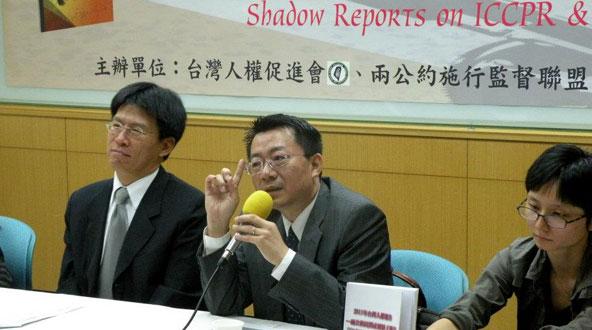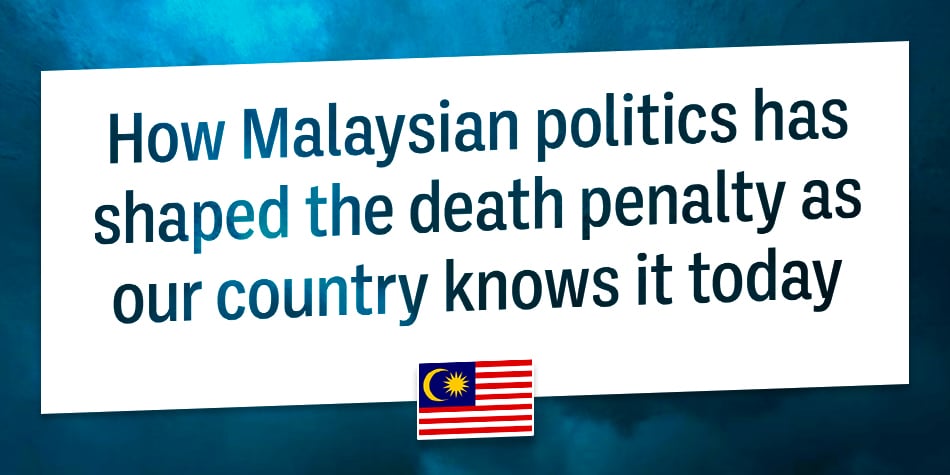
Death penalty at the heart of human rights review
International standards
The World Coalition and its local member, the Taiwan Alliance to End the Death Penalty (TAEDP), have been highlighting the abuses linked to the use of the death penalty as part of their contribution to a national human rights review similar to those conducted by United Nations bodies.
Before leaving China’s UN seat to representatives from the People’s Republic of China in 1971, the Taiwanese authorities had signed two major pieces of international legislation – the International Covenants on Economic, Social and Cultural Rights (ICESR) and on Civil and Political Rights (ICCPR).
Their implementation was never subjected to the scrutiny of UN human rights bodies because Taiwan is no longer a member state. Instead, the authorities passed legislation in 2009 to transpose the two covenants into national law.
Then began an open human rights review process leading to the examination of the country’s observance of the ICESR and the ICCPR by a panel of international experts between 25 February and 1st March 2013.
3rd March 2013 update:
The international experts have released their concluding observations and recommandations (available in English and in Chinese). They praised government officials and civil society organisations for their participation in the process.
“The experts strongly recommend that the government of Taiwan intensifies its efforts towards abolition of capital punishment and, as a first and decisive step, immediately introduces a moratorium on executions in accordance with the respective resolutions of the UN General Assembly,” they wrote.
They added that “all 15 cases of executions carried out in Taiwan in the last three years” were carried out before procedures seeking pardon or commutation were concluded, which constituted a “violation” of the ICCPR.
They also found that torture was used to extract confession in several capital cases and called on the authorities to commute those sentences.
Shadow report
The government has published its own reports on the human rights situation in Taiwan and a coalition of 45 national human rights NGOs, Covenants Watch, has replied with shadow reports.
The reports on the ICCPR offer an insight into the death penalty situation in Taiwan. In its submission, the government stated that the official position since 2007 was “to gradually abolish the death penalty”. The authorities acknowledged points of concern, including the current practice of carrying out executions secretly without informing the convict’s family. “Whether or not this meets the Covenant’s requirements should be taken seriously,” the government wrote.
The authorities also noted that the number of death sentences and executions was rising rapidly after more than four years without executions between 2006-2010. They detailed two recent cases in which they accepted that “the judges reached the verdict based on confessions obtained through unlawful arrests, illegal detentions, unlawful interrogations by torture” and an innocent was executed for a murder he did not commit.
“Far behind schedule”
But the 19 pages of remarks on the death penalty in Covenant Watch’s shadow report argued that the government did not go far enough. According to the activists, criminal law reform to reduce the scope of the death penalty is “far behind schedule”.
In answer to the past miscarriages of justice identified by the government, the shadow report states that “cases still occur in which the determination of guilt for a defendant is based on testimony extracted through torture” and “seven of the nine persons executed in April 2010 and March 2011 did not have defence counsel in their third-level trials”.
Covenants Watch also considered that the official report neglected to examine death row conditions and the use of the death penalty against mentally ill people.
“Measures should include a moratorium”
The conclusion of the Right to life section in the shadow report read: “If, as the State Report indicated, the Taiwan government has already adopted a policy position of gradual phasing out of the death penalty, then it should not only clearly affirm that abolition of the death penalty is a national policy but should also put forward concrete policy content for abolition of the death penalty and timetables for realization of this policy in the short, medium and long term along with appropriate implementation plans and complementary measures. Such measures should include a moratorium on the execution of death sentences, the promotion of comprehensive dialogue and discussion in society, the study and drafting of substitution measures, and reparations and guarantees for victims.”
TAEDP contributed the remarks on the death penalty to the shadow report. Its executive director Lin Hsinyi said: “Since 2010, 15 death row inmates were executed. All of them had asked for amnesty but received no response from the President before their executions. I hope that the Ministry of Justice understands that this is a violation of the ICCPR. Besides, I hope the Ministry of Justice understands that they are under the obligation to work positively toward the abolition of the death penalty.”
The international experts have already published a list of questions they will ask the authorities during their February visit, and many reflect the concerns expressed in the shadow report, such as: “The State Report affirms that the ‘death penalty is brutal from the perspectives of humanity and the Covenant’. Nevertheless, policies on how to abolish the death penalty ‘are yet to take shape’. Which efforts have been undertaken by the current Government of Taiwan to abolish the death penalty and to reduce the number of death sentences and to at least introduce a moratorium in accordance with various UNGA resolutions?”
International perspective
Before they issue their conclusions, the experts will consider additional information including a submission by the World Coalition, which Lin Hsinyi says will add “international perspective” to the review. The World Coalition, whose Steering Committee will meet in the country in April, called on Taiwan’s authorities to “amend any laws that do not meet the requirements of the ICCPR, including to abolish the death penalty for crimes that do not result in loss of life”.
More than anything, the human rights review will be an opportunity to launch public debates and disseminate information in a country where entrenched positions have led a growing number of supporters of the death penalty to send threats and unpleasant messages to TAEDP. “We understand why there are negative emotional expressions,” said Lin Hsinyi. “Most people don’t have enough information about the truth and impacts of the death penalty and so they feel threatened, insecure or even offended when thinking about abolishing the death penalty. If we can have more facts revealed and try to communicate more, we believe there will be less hostility.”
Update 18 February 2013 :
Amnesty International France handed in more than 100,000 signatures on a petition calling for mercy in the case of death row inmate Chiou Ho-shun and for a moratorium aiming to abolish the death penalty to Taiwan’s diplomatic representation in Paris on 14 February.







